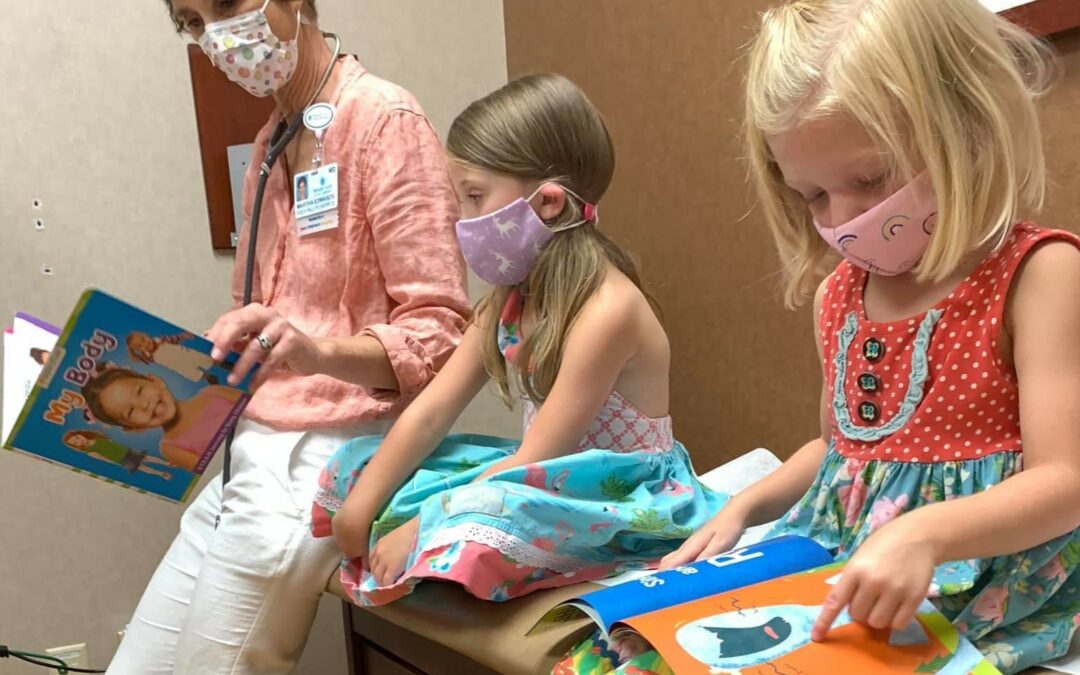Pediatrician Dr. Martha Edwards says that sometimes, handing a book to a child can be “a more important tool for me than my stethoscope.”
Edwards, a physician with Rock Hill Pediatrics and medical director for the South Carolina Reach Out and Read, said that during a well child visit, a book is the first thing she offers a patient.
“It helps me see how they are developing, for a toddler,” she said. “Even a baby as young as six months will take a book and put it in their mouth…It’s an assessment tool and a greeting tool. In an older child, it helps me assess speech and social and emotional skills.”
The Early Learning Partnership of York County administers Reach Out and Read, a national evidence-based program, in 10 pediatric medical offices across York County, including Rock Hill Pediatrics.
Children birth to age 5 receive a new book to read with their family from participating doctors during their well child visits. But Edwards said giving out books and encouraging early reading is only the beginning of ROR.
“It does have so much evidence-based success,” Edwards said about ROR. “There’s a lot that suggests that it does make a difference in various ways, not just with literacy, but with resilience, with stronger families by connecting families early on.”
Through ELP’s collaboration with the national ROR office and its ROR-Carolinas affiliate, ELP provides training to the medical team and new children’s books that are both diverse and age and language appropriate. The program promotes bonding, early brain development and a love of learning in young children and families.
Edwards said having ELP administer ROR and raise money to purchase the books is a huge help. “Some practices or states have to go on a shoestring budget, and really can’t keep that flow of books coming that we take for granted because of the Early Learning Partnership of York County.”
The training physicians receive, Edwards said, helps them use books they provide to make assessments of a child’s development faster and more accurate. That assessment can include things like vocabulary and social skills.
The parent-child bonding that happens when families read together often is a crucial part of ROR.
“It helps to get the message to the family, to interact with the child, not around a screen. Because what we know now is, what makes a resilient child is connection after connection with a trusted caregiver. It’s day after day, not one connection.”
Resilient children are those who have the skills to navigate the stress they will inevitably encounter as they grow, she said. “It’s more than a literacy program,” she said. “Really, to me, I take it well beyond that.”
Edwards, who has been involved in ROR for about 20 years, said before that, pediatricians didn’t usually talk much about reading. Now, she said, it’s more of a standard of pediatric care. “It’s an important conversation to have,” she said.
She said children can continue to enjoy reading with their parents, even when they’re old enough to read on their own. “To me, the goal shouldn’t be that they read, but that they read and they enjoy reading with you.”
The range of diverse books the program provides include characters that children can relate to, she said. It also provides books that can help children understand their emotions and deal with change.
“A lot of the books have the main character as a person of color, or someone from a different country,” she said. “And I think all of us that love reading understand that through literature, there are some universal struggles we all go through. That can be a very comforting thing for a child, that this is everybody.”
Edwards believes the program makes a difference in her patients’ lives.
“You use a book to talk about so many things that are important in a child’s whole life,” she said, adding that enjoying a book with a trusted caregiver can help them process those things. “Sometimes, at the end of the day, you can process your day, and it’s good to do that around a book. If something difficult happened, or something made them mad or sad, they can process that with a safe adult.”
Contact us if you have stories to share about your ROR experience at your pediatric practice.

